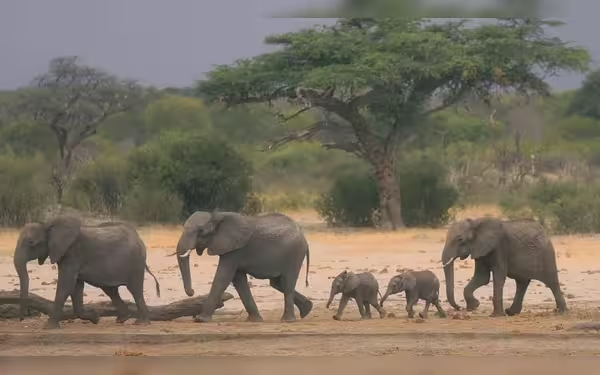Saturday, November 16, 2024 09:55 PM
Zimbabwe Plans Culling of 200 Elephants Due to Food Shortages
- Zimbabwe faces severe food shortages due to drought.
- Government to cull 200 elephants to manage overpopulation.
- Human-elephant conflicts escalate in Hwange region.
 Image Credits: thecurrentpk
Image Credits: thecurrentpkZimbabwe plans to cull 200 elephants amid severe food shortages caused by drought, raising ethical concerns over wildlife management.
Zimbabwe is facing a significant challenge as it grapples with an unprecedented drought that has resulted in severe food shortages. This situation has prompted the government to take drastic measures, including the decision to cull 200 elephants. The country’s wildlife authority announced this plan, highlighting the dual issues of food scarcity and an overpopulation of elephants.
According to Zimbabwe’s environment minister, the nation currently has "more elephants than it needed." This statement reflects a growing concern about the balance between wildlife conservation and the needs of local communities. The government has directed the Zimbabwe Parks and Wildlife Authority (ZimParks) to initiate the culling process, particularly in areas where elephants have been clashing with humans. One of the most affected regions is Hwange, which is home to Zimbabwe’s largest natural reserve.
Fulton Mangwanya, the Director General of ZimParks, confirmed that the culling will focus on regions where human-elephant conflicts are prevalent. This decision is not taken lightly, as it raises ethical questions about wildlife management and conservation efforts. While some may argue that culling is a necessary step to protect both human lives and agricultural interests, others believe that more humane solutions should be sought.
The situation in Zimbabwe serves as a reminder of the delicate balance between nature and human needs. As the population of elephants continues to grow, the challenges faced by local communities also increase. It is crucial for governments and wildlife authorities to find sustainable solutions that protect both wildlife and human livelihoods.
The culling of elephants in Zimbabwe highlights the complex interplay between environmental challenges and wildlife management. As the country navigates through this difficult period, it is essential to consider the long-term implications of such actions. Finding a balance that respects both human and animal rights will be key to ensuring a harmonious coexistence in the future.













